

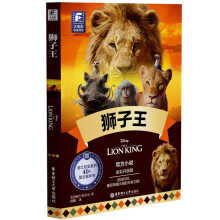
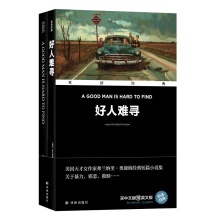

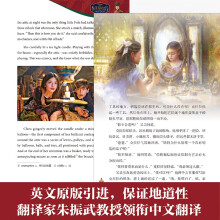
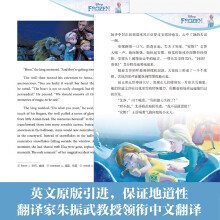


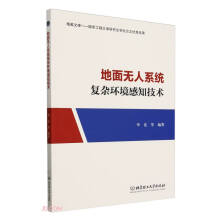

《愤怒的葡萄》是美国现代小说家约翰·斯坦贝克发表于1939年的长篇小说,描写了美国20世纪30年代经济恐慌期间大批农民破产、逃荒的故事,反映了惊心动魄的社会斗争的图景。小说饱含美国农民的血泪、愤慨、和斗争。该作获得1940年美国普利策文学奖。
本书为英文原版,经典32开本便于随身携带阅读,精校版忠于原著,同时提供英文朗读免费下载。在品读精彩故事的同时,亦能提升英语阅读水平,进入图书封底博客链接即可进入下载页面。
《愤怒的葡萄》以经济危机时期中部各州农民破产、逃荒和斗争为背景。俄克拉何马和邻近的得克萨斯、堪萨斯、阿肯色各州的农民负债累累,土地被大公司没收,无家可归,只得向西迁移,想在加利福尼亚州寻找出路。
小说以约德一家为代表,记叙了他们一家十二口从俄克拉荷马州向加利福尼亚州逃荒的艰难经历。他们将家中的一切变卖后,换来一辆破旧的汽车,一家坐车向西逃荒。途中年轻的诺亚和康尼则在半路上开了小差。到了加州后,一切并不像他们想像的那样美好,等待他们的仍然是失业、饥饿和困苦。小说标题《愤怒的葡萄》中的"愤怒"便是对导致人们贫困的不公的社会制度的强烈抗议。本书为英文原版,经典32开本便于随身携带阅读,精校版忠于原著,同时提供英文朗读免费下载。
The Grapes of Wrath is an American realist novel written by John Steinbeck. The book won the National Book Award and Pulitzer Prize for fiction, and it was cited prominently when Steinbeck was awarded the Nobel Prize in 1962.
Set during the Great Depression, the novel focuses on the Joads, a poor family of tenant farmers driven from their Oklahoma home by drought, economic hardship, agricultural industry changes, and bank foreclosures forcing tenant farmers out of work. Due to their nearly hopeless situation, and in part because they are trapped in the Dust Bowl, the Joads set out for California. Along with thousands of other "Okies", they seek jobs, land, dignity, and a future.
The Grapes of Wrath is frequently read in American high school and college literature classes due to its historical context and enduring legacy. A celebrated Hollywood film version, starring Henry Fonda and directed by John Ford, was released in 1940.
To the Red country and part of the gray country of Oklahoma, the last rains came gently, and they did not cut the scarred earth. The plows crossed and recrossed the rivulet marks. The last rains lifted the corn quickly and scattered weed colonies and grass along the sides of the roads so that the gray country and the dark red country began to disappear under a green cover. In the last part of May the sky grew pale and the clouds that had hung in high puffs for so long in the spring were dissipated. The sun flared down on the growing corn day after day until a line of brown spread along the edge of each green bayonet. The clouds appeared, and went away, and in a while they did not try any more. The weeds grew darker green to protect themselves, and they did not spread any more. The surface of the earth crusted, a thin hard crust, and as the sky became pale, so the earth became pale, pink in the red country and white in the gray country.
In the water-cut gullies the earth dusted down in dry little streams. Gophers and ant lions started small avalanches. And as the sharp sun struck day after day, the leaves of the young corn became less stiff and erect; they bent in a curve at first, and then, as the central ribs of strength grew weak, each leaf tilted downward. Then it was June, and the sun shone more fiercely. The brown lines on the corn leaves widened and moved in on the central ribs. The weeds frayed and edged back toward their roots. The air was thin and the sky more pale; and every day the earth paled.
In the roads where the teams moved, where the wheels milled the ground and the hooves of the horses beat the ground, the dirt crust broke and the dust formed. Every moving thing lifted the dust into the air: a walking man lifted a thin layer as high as his waist, and a wagon lifted the dust as high as the fence tops, and an automobile boiled a cloud behind it. The dust was long in settling back again.
When June was half gone, the big clouds moved up out of Texas and the Gulf, high heavy clouds, rain-heads. The men in the fields looked up at the clouds and sniffed at them and held wet fingers up to sense the wind. And the horses were nervous while the clouds were up. The rain-heads dropped a little spattering and hurried on to some other country. Behind them the sky was pale again and the sun flared. In the dust there were drop craters where the rain had fallen, and there were clean splashes on the corn, and that was all.
A gentle wind followed the rain clouds, driving them on northward, a wind that softly clashed the drying corn. A day went by and the wind increased, steady, unbroken by gusts. The dust from the roads fluffed up and spread out and fell on the weeds beside the fields, and fell into the fields a little way. Now the wind grew strong and hard and it worked at the rain crust in the corn fields. Little by little the sky was darkened by the mixing dust, and the wind felt over the earth, loosened the dust, and carried it away. The wind grew stronger. The rain crust broke and the dust lifted up out of the fields and drove gray plumes into the air like sluggish smoke. The corn threshed the wind and made a dry, rushing sound. The finest dust did not settle back to earth now, but disappeared into the darkening sky.
The wind grew stronger, whisked under stones, carried up straws and old leaves, and even little clods, marking its course as it sailed across the fields. The air and the sky darkened and through them the sun shone redly, and there was a raw sting in the air. During a night the wind raced faster over the land, dug cunningly among the rootlets of the corn, and the corn fought the wind with its weakened leaves until the roots were freed by the prying wind and then each stalk settled wearily sideways toward the earth and pointed the direction of the wind.
The dawn came, but no day. In the gray sky a red sun appeared, a dim red circle that gave a little light, like dusk; and as that day advanced, the dusk slipped back toward darkness, and the wind cried and whimpered over the fallen corn. Men and women huddled in their houses, and they tied handkerchiefs over their noses when they went out, and wore goggles to protect their eyes.
When the night came again it was black night, for the stars could not pierce the dust to get down, and the window lights could not even spread beyond their own yards. Now the dust was evenly mixed with the air, an emulsion of dust and air. Houses were shut tight, and cloth wedged around doors and windows, but the dust came in so thinly that it could not be seen in the air, and it settled like pollen on the chairs and tables, on the dishes. The people brushed it from their shoulders. Little lines of dust lay at the door sills.
Chapter 1 /1
Chapter 2 /5
Chapter 3 /15
Chapter 4 /18
Chapter 5 /34
Chapter 6 /44
Chapter 7 /68
Chapter 8 /74
Chapter 9 /96
Chapter 10 /100
Chapter 11 /129
Chapter 12 /132
Chapter 13 /138
Chapter 14 /170
Chapter 15 /173
Chapter 16 /185
Chapter 17 /221
Chapter 18 /230
Chapter 19 /265
Chapter 20 /275
Chapter 21 /323
Chapter 22 /326
Chapter 23 /372
Chapter 24 /379
Chapter 25 /396
Chapter 26 /400
Chapter 27 /465
Chapter 28 /469
Chapter 29 /496
Chapter 30 /500
温馨提示:请使用湖州市图书馆的读者帐号和密码进行登录